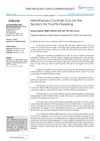 June 2023 in “BMC Pharmacology and Toxicology”
June 2023 in “BMC Pharmacology and Toxicology” The trial will test if proxalutamide is safe and effective in reducing death in severe COVID-19 patients.
 5 citations,
October 2022 in “Phenomics”
5 citations,
October 2022 in “Phenomics” Your skin is like an ecosystem, with its own community of microbes and substances that interact and affect its health.
7 citations,
July 2021 in “PubMed” Vitamins A, B, C, and D are important for skin health and are being explored for new uses, but more research is needed to confirm their effectiveness.
9 citations,
May 2018 in “Photochemistry and photobiology” The Hair BB Cream effectively prevents UV damage and improves hair health.
 3 citations,
January 2016 in “Journal of cosmetology & trichology”
3 citations,
January 2016 in “Journal of cosmetology & trichology” Taking vitamins, minerals, and amino acids can improve hair strength and quality in people with Monilethrix.
 1 citations,
September 2022 in “Journal of dermatological science”
1 citations,
September 2022 in “Journal of dermatological science” Certain vitamins and their derivatives can help hair grow longer by activating specific growth signals.
1 citations,
January 1980 in “Side effects of drugs annual” Taking too much vitamin A can cause health problems like bone pain and hair loss.
 1 citations,
May 2019 in “Bioactive compounds in health and disease”
1 citations,
May 2019 in “Bioactive compounds in health and disease” Certain vitamins, minerals, and foods like black raspberry extract and egg yolks can help reduce hair loss and promote hair growth.
 9 citations,
November 2014 in “Journal of Cutaneous Medicine and Surgery”
9 citations,
November 2014 in “Journal of Cutaneous Medicine and Surgery” Many dermatologists in Saudi Arabia recommend vitamins and minerals for hair loss, often based on personal experience rather than strong evidence.
 1 citations,
July 2012 in “EFSA Journal”
1 citations,
July 2012 in “EFSA Journal” The combination of certain vitamins and pumpkin seed oil has not been proven to maintain normal hair.
March 2021 in “CRC Press eBooks” Mesotherapy involves injecting substances like dutasteride, minoxidil, and vitamins into the skin to treat hair loss and skin conditions, with good patient satisfaction but possible skin inflammation.
 January 2023 in “Side effects of drugs annual”
January 2023 in “Side effects of drugs annual” Some vitamins, amino acids, and alternative medicines can cause serious side effects, including bone, muscle, and skin issues, and healthcare professionals should be aware of these risks.
 3 citations,
March 2022 in “International Journal of Trichology”
3 citations,
March 2022 in “International Journal of Trichology” Special supplements with collagen, vitamins, and minerals can help treat hair loss.
 October 2017 in “The American journal of gastroenterology”
October 2017 in “The American journal of gastroenterology” Three patients suffered severe health issues due to not getting enough vitamins and minerals after weight-loss surgery.
 1 citations,
January 2021 in “International journal of pharmaceutical research”
1 citations,
January 2021 in “International journal of pharmaceutical research” Low levels of ferritin, TSH, and certain vitamins are linked to hair loss in women of different ages.
March 2020 in “The Thai Journal of Veterinary Medicine” A Thai Bangkaew dog with diabetes and pancreatic issues improved with insulin, enzymes, and vitamins.
 119 citations,
January 2012 in “Nutrition & Metabolism”
119 citations,
January 2012 in “Nutrition & Metabolism” Modern lifestyles, including poor diet, stress, and long-term use of certain medications, hinder the body's ability to heal from inflammation, leading to chronic diseases.
1 citations,
August 2012 in “Pediatrics in review” Not getting enough vitamin D can lead to health problems, so kids over one should get 600 IU/day.
December 2021 in “Asian journal of pharmaceutical and clinical research” The homemade hair oil made from natural ingredients helps hair grow, reduces hair fall, dandruff, and graying, and makes hair shiny with few or no side effects.
 10 citations,
July 2018 in “Our Dermatology Online”
10 citations,
July 2018 in “Our Dermatology Online” Some vitamins and minerals are important for preventing hair loss, but treating hair loss with them without a known deficiency is not proven effective.
 December 2021 in “Trichology and cosmetology:”
December 2021 in “Trichology and cosmetology:” Taking Kera-Diet® improves hair and nail health without side effects.
 December 2010 in “Bariatric Nursing and Surgical Patient Care”
December 2010 in “Bariatric Nursing and Surgical Patient Care” Hair loss after bariatric surgery can be reduced by staying hydrated, eating enough protein, taking vitamins, managing stress, and possibly using biotin.
 March 2017 in “Trichology and cosmetology:”
March 2017 in “Trichology and cosmetology:” Cosmetic procedures can improve skin appearance and boost confidence.
 January 2023 in “Rossiiskii Zhurnal Kozhnykh i Venericheskikh Boleznei”
January 2023 in “Rossiiskii Zhurnal Kozhnykh i Venericheskikh Boleznei” Androgenic alopecia in men is mainly linked to family history, hormonal imbalances, and metabolic issues, but can also be influenced by lifestyle habits, environmental factors, and deficiencies in certain vitamins and microelements like copper.
April 2007 in “CRC Press eBooks” Certain vitamins in wrong amounts, alcohol abuse, metals, and other toxins can cause serious brain and nerve damage.
 3 citations,
May 2018 in “Journal of nutritional health & food science”
3 citations,
May 2018 in “Journal of nutritional health & food science” Nutritional supplements can help manage hair loss and promote hair growth by strengthening hair roots and countering harmful effects of pollution, smoking, and deficiencies in vitamins and minerals.
 1 citations,
November 2011 in “Dermatologica Sinica”
1 citations,
November 2011 in “Dermatologica Sinica” Women using hair relaxers with alopecia had lower zinc levels, suggesting zinc deficiency might contribute to hair loss.
 September 2005 in “Journal of Investigative Dermatology”
September 2005 in “Journal of Investigative Dermatology” Ferulic acid helps stabilize vitamins C and E for better skin protection from the sun, certain compounds may promote hair growth, atopic dermatitis patients have lower skin defense molecules, older men are more likely to get a type of skin cancer, and a substance called relaxin may prevent age-related skin thickening.
19 citations,
November 1937 in “Experimental biology and medicine” Nutritional deficiencies in rats cause skin problems that can be treated with the right vitamins.
 36 citations,
May 2021 in “Nutrients”
36 citations,
May 2021 in “Nutrients” Natural molecules like inositols, resveratrol, vitamins, and omega-3 fatty acids may help manage Polycystic Ovary Syndrome (PCOS), but their effects vary and need more exploration.





















